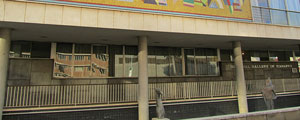
FOCUSING on alerting viewers on the environmentally unfriendly community in Harare’s Dzivarasekwa high-density suburb, the National Gallery of Zimbabwe (NGZ) will on Saturday present The Cycle, a solo exhibition by Davina Jogi, a Harare-based freelance photojournalist.
Report by Tinashe Sibanda, Entertainment Reporter
The Cycle is an environmental awareness exhibition through the eyes of a photographer looking at the adverse impacts of water pollution.
“Our cities have become so polluted that it is necessary to highlight these issues through such works because environmental pollution has become one of the 21st century crimes that need attention. Art is a real medium to explore such issues,” said Jogi.
She said Zimbabwe was one of only four countries in Africa that still depended on a municipal rather than privatised system of water supply, with a lack of investment in water infrastructure since the 1970s.
“The collapse of the water purification process in particular has seriously impacted the health, safety, dignity and livelihoods of Harare residents.
“Although The Cycle tells the story of Harare, its intention is to create awareness about the need for urban water management in cities around the world.
“As a result, in Harare, water has become a scarce commodity with the council able to supply only half the city’s requirements. Questions are being raised over its quality. A growing private water industry has begun to take up the slack.”
- Chamisa under fire over US$120K donation
- Mavhunga puts DeMbare into Chibuku quarterfinals
- Pension funds bet on Cabora Bassa oilfields
- Councils defy govt fire tender directive
Keep Reading
She said the exhibition would depict how in Harare the wealthier suburbs were located at the apex of the water supply cycle and residents there could afford to sink their own boreholes or buy water.
She revealed how for those “living downstream” in the poorer high-density suburbs — which are totally dependent on the municipality — Harare’s water system formed a potentially deadly cycle for which a viable solution was yet to be found.
Jogi’s works focus on telling daily life stories about Zimbabwe that are often not covered by international media.
She has worked with a variety of local and international newspapers, magazines and non-governmental organisations.
She is one of the founding directors of the Zimbabwe Association of Female Photographers, which provides practical support to women photographers in the media industry.
Jogi was awarded the 2012 Media and Advocacy Grant from Market Photo Workshop for which she photographed The Cycle.











